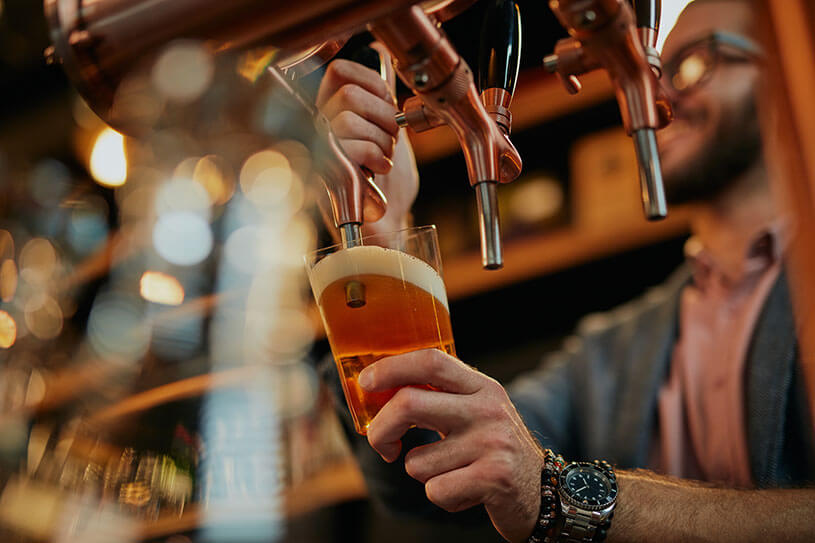Alcohol duty changes made a splash when the rules changed last August – marking the biggest reform to the alcohol duty system in 140 years.
But what exactly is changing and who does it affect? Keep reading to find out.
What is alcohol duty?
Alcohol duty is a tax included in the price you pay for alcohol, which generates revenue for the government. Currently, the alcohol duty system has four separate categories, taxing beer, cider, spirits, and wine.
But from 1 August 2023, the system simplified – with all alcoholic drinks now being taxed based on their alcohol by volume (ABV), by litre of alcohol.
This change created six standardised categories – regardless of alcohol type – with stronger alcoholic products having higher duty rates than drinks of a lower strength.
New alcohol duty system rates – August 2023
Strength of alcohol | Rate of duty by litre of alcohol |
Less than 1.2% | £0 |
1.2% to 3.5% | £9.27 |
3.5% to 8.5% |
|
8.5% to 22% | £28.50 |
Higher than 22% | £31.64 |
Alcohol duty frozen until 2025
But as inflation and cost of living rates continue to rise, business owners were worried that the duty rates were set to increase again.
Luckily for those in the hospitality sector, during this year’s Spring Budget, Chancellor Jeremy Hunt extended the temporary freeze on alcohol duty until 1 February 2025.
While the freeze was extended, there were no announcements regarding revisions to the alcohol duty legislation.
Alcohol duty changes: who’ll be affected?
If you work in alcohol production, sales, or hospitality, it’s likely that the new alcohol duty system will affect your business. Changes to pricing could happen in both the production and distribution of alcohol – and even in pubs and restaurants – as stronger alcoholic products may cost more through the revised duty structure.
There’s a benefit outside of the business world too – as the government hopes that this new lower rate of duty on drinks less than 3.5 per cent ABV will help encourage and innovate new lower strength drinks, supporting responsible drinking in the UK.
Jonathan Athow, Director General of Customer Strategy & Tax Design at HMRC, says: “After listening to feedback from industry, economists, public health groups and many business owners, the new alcohol duty system will be based on the founding principle of taxing alcoholic products by strength, ensuring consistency across the board for the first time.”
Relief and exemptions
Small brewers relief for breweries and producers
The new alcohol duty system changes will replace and extend the small brewers relief with the new small producer relief. Small businesses producing alcoholic products with an ABV of less than 8.5 per cent will qualify for reduced rates on their products (if they produce less than 4,500 hectolitres a year).
You can check if you qualify for small producer relief here.
Draught relief for hospitality businesses
The hospitality industry will also get a reduced rate for draught products thanks to the new draught relief. This means that alcohol duty is reduced on qualifying beer and cider by 9.2 per cent – as well as on wine, spirited, and other fermented products by 23 per cent.
This is a big win for small businesses, as pubs will pay less duty for every pint sold than the supermarkets will.
Draught relief will only apply to products under 8.5 per cent ABV. The product must also be in a container that’s at least 20 litres and designed to connect to a dispense system. There will be a penalty on decanting these products to avoid misuse of the relief scheme.
Temporary wine arrangements
From 1 August 2023 to 1 February 2025, producers and importers of wine will see 18 months of temporary arrangements when calculating duty on their products – to support the transition to the new method of calculating alcohol duty.
These arrangements will consider all wine between 11.5 per cent and 14.5 per cent ABV to have an ABV of 12.5 per cent.
What do you think of the new changes to how alcohol duty is calculated? Let us know in the comments below.
More small business guides for the hospitality industry
- A guide to street food and starting a food truck business
- A complete guide to tax for small businesses
- 5 tips on how pubs and restaurants can reduce no-shows
- What does public liability insurance cover?
Get a quote for pub insurance
Looking for pub insurance? Build a policy that includes public liability insurance and employers-liability insurance, as well as other covers that suit your business.
Photo: chika_milan/stock.adobe.com
